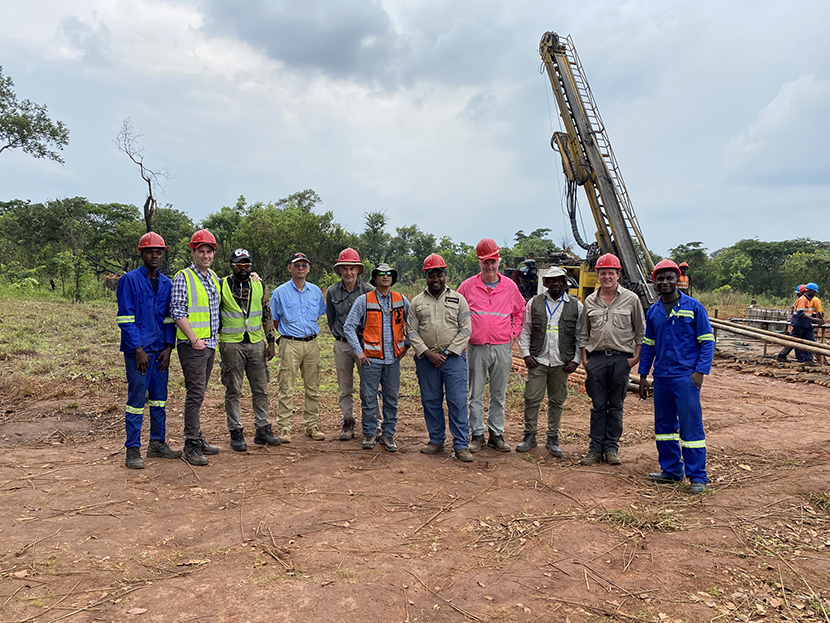JV Article: Midnight Sun Mining partners with KoBold Metals; First Quantum

In February, Midnight Sun Mining teamed up with KoBold Metals, a privately held U.S. AI-driven mining and exploration company backed by technology investors including Bill Gates and Silicon Valley venture capital firm Andreessen Horowitz, to explore Dumbwa, one of four targets on its Solwezi copper project in the heart of the Zambia-Copper Belt.
KoBold will spend $15 million on exploration over the next four years and make cash payments to Midnight Sun of C$500,000, to earn a 75% interest in the target and the team will be led by David Broughton, KoBold’s chief copper geologist.
Broughton is no stranger to the project, which lies just a few kilometres from First Quantum Minerals’ (TSX: FM) Kanshanshi mine, Africa’s largest copper mining complex. The world-renowned expert in sediment-hosted copper deposits credited with Ivanhoe Mines’ (TSX: IVN; US-OTC: IVPAF) Kamoa and Platreef discoveries, has been keeping a close eye on the Solwezi license area since First Quantum was forced to shed the asset more than a decade ago, due to the “use it or lose it” aspect of Zambia’s mining act.
“He identified this as a Tier-One exploration asset and he’s very excited,” says Adrian O’Brien, Midnight Sun’s marketing and communications director. “He told our CEO years ago never to lose the property, it’s incredibly valuable.”
The 506-sq-km project is surrounded by other world-class copper mines. Barrick Gold’s (TSX: ABX; NYSE: GOLD)Lumwana mine sits 50 km to the west; CMOC Group’s Tenke Fungurume mine, lies 50 km to the north; Ivanhoe’s Kamoa-Kakula copper complex is 80 km to the northwest; and First Quantum’s Sentinel mine is 100 km due west.
The Dumbwa target KoBold will be exploring sits in the southern portion of the Solwezi project and features a 20-km-long soil anomaly with a peak grade of 0.73% copper. “It’s the highest copper in soil anomaly on record in Zambia,” O’Brien says in an interview. “If you look at the operating mines in the area, the average grade is around .59% copper so the grades we see at surface at Dumbwa are almost astronomical by comparison.”
Drill highlights from Dumbwa include 13 metres of 0.63% copper including 3 metres of 1.3% copper starting from 85.0 metres downhole in drill hole DC15-03; 12 metres of 0.65% copper including 6 metres of 1.06% copper starting from 0.0 metres in drill hole DCAC-39; 13.5 metres of 0.77% copper from 5.0 metres in drill hole SDDD06; 16 metres of 1.24% copper from 164.0 metres in drill hole SDRC13; and 15 metres of 0.71% copper from 34.0 metres in drill hole SDRC05.
KoBold plans to drill aggressively starting this summer and will leverage AI through its proprietary analytical tools and big data to accelerate the exploration process. “Having KoBold get behind the project and led by top geologists gives us an audience we’ve never been able to access,” O’Brien says. “We’ve been wanting to hire Broughton for seven years and all of a sudden we’ve got him working with us, on one of his top copper picks in Zambia.”
Meanwhile, the company plans to kick off an initial oxide copper drill program later this month at Kazhiba Dome, followed by a second phase of drilling at Mitu, under a new co-operative arrangement with First Quantum.
In April the two companies agreed to jointly define potential feed sources at the Solwezi project for First Quantum’s SW/EW oxide copper circuit at its Kansanshi mine. The mine has depleted oxide reserves and is transitioning to a large sulphide development and is looking to enhance feed grades and utilize sulfuric acid produced by its onsite smelter. For its part, Midnight Sun can receive significant near-term cash flow from the oxide material at Solwezi.
“We’ve been talking to them for two years now about becoming a source of feed material,” O’Brien says. “First Quantum will supply geological bench strength and design a drill plan and help us with the cost by doing assaying and metallurgical work and we’ll cover the cost of drilling and see whether there is a viable resource at Kazhiba Dome and Mitu. We have intercepted a lot of oxide material at Kazhiba, much of it high-grade and right at surface, so we know it’s highly prospective.”
Drilling at Kazhiba Dome has intercepted intervals of oxide mineralization and an oxide copper blanket.
Drill highlights include 14.2 metres of 5.71% copper 12.0 metres downhole in drillhole SLZ-DD0101; 24 metres of 3.15% copper 20.0 metres downhole in drill hole SLZ-RC-002; and 8 metres of 5.14% copper starting from 21.7 metres in drill hole SLZ-DD-005.
Midnight Sun will then move to the Mitu target in the southwest, where good grades have also been found right at surface. Highlights include 11.6 metres of 3.44% copper in drill hole MDD-17-15 starting from 151.6 metres and 11.5 metres of 1.41% copper starting from 113.5 metres in drill hole MTDD-044. “Mitu has a much larger footprint—it’s three to five times bigger than the target at Kazhiba so that will be added to the drill plan,” O’Brien says.
“These last 12 to 14 months have been very exciting,” O’Brien continues. “We were planting a lot of seeds and getting things ready and figuring out how to move this massive project forward and we ended up with a very significant deal with KoBold and the arrangement with First Quantum, so everything is in motion, and it’s become a super exciting time.”
Midnight Sun plans to eventually explore its three other sed-ex copper targets—the Kazhiba Dome, Mitu and Crunch.
The Kazhiba Dome target is underlain by a previously undiscovered basement dome similar to those at Kansanshi and Solwezi. Domes are believed to be associated with the copper mineralization at the Kansanshi, Lumwana and Sentinel mines.
The preceding Joint Venture Article is PROMOTED CONTENT sponsored by Midnight Sun Mining and produced in co-operation with MINING.com. Visit: www.midnightsunmining.com for more information.



Comments